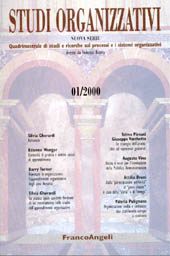Does the Equal Opportunities Committee make democracy work (better) in academia?
137-161 p.
The democratization of organizations is studied in this article with reference to the university system. In recent years, Italian universities have followed the European trend in redesigning themselves as organizations attentive to performance, excellence, and achievement. This has resulted in the enhancement of mechanisms of 'adverse selection' for women, both in career advancement and in access to decision-making positions. But compared to other European countries, Italian universities have lagged behind in policies to promote gender equality. However, they have for some time been endowed with bodies, the Equal Opportunities Committees (Comitati Unici di Garanzia, CUGs), established in order to reduce discrimination and to promote greater participation in the academic organization.
The functioning of the CUGs, which varies greatly at local level, is linked to the possibility of benefiting from resources of various kinds. Research shows that the resources that central governance makes available to a CUG are important. So too are the relational networks in which the members of the CUG are involved and which increase their visibility, legitimacy, and motivation. The interaction between top-down and bottom-up resources furnishes an analytical framework useful for interpreting the variable effectiveness of the CUGs in the democratic quality of Italian universities. It also helps to conduct more detailed specification of some theoretical dimensions already brought to the attention of scholars in the perspective known as 'fixing the organizations'. [Publisher's text].
La democratizzazione delle organizzazioni è qui studiata con riferimento all'Università. Negli anni passati le università italiane hanno seguito con determinazione la tendenza europea a ridisegnarsi come organizzazioni attente alla performance, ai percorsi di eccellenza e di merito, acuendo meccanismi di "selezione avversa" per le donne, sia nelle fasi della carriera che nell'accesso alle posizioni decisionali. Ma rispetto ad altri paesi europei hanno accumulato ritardi nelle politiche di promozione della equità di genere. Tuttavia, da tempo le università italiane sono state dotate di organismi, i Comitati unici di Garanzia -CUG- istituiti con l'obiettivo di promuovere la qualità democratica dell'organizzazione.
Il funzionamento del CUG, molto variabile a livello locale, è legato alla possibilità di beneficiare di risorse di diverso tipo. La ricerca mostra che sono importanti le risorse che la governance centrale mette a disposizione del CUG, ma che rilevano anche le reti di relazioni in cui i membri del CUG sono coinvolti e che ne accrescono la visibilità, la legittimità e la motivazione. L'interazione fra risorse top down e bottom up offre una griglia di analisi in grado di interpretare l'efficacia variabile dei CUG nei processi di democratizzazione delle università italiane, nonché di formulare, su un piano teorico, una più dettagliata articolazione analitica di alcune dimensioni di analisi già poste all'attenzione della letteratura nella prospettiva nota come 'fixing the organisations'. [Publisher's text].
Is part of
Studi organizzativi : XXV, 2, 2023-
Articles from the same issue (available individually)
-
Information
ISSN: 1972-4969
KEYWORDS
- Università italiane, Governance universitaria, Comitato Pari Opportunità, Parità di genere, democrazia organizzativa
- Italian universities, university governance, equal opportunities committee, gender parity, organizational democracy


